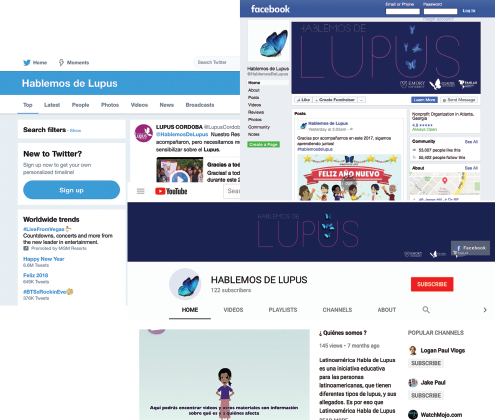A person living with lupus may feel isolated. They receive information from their doctor, but it’s never enough to fully understand the disease. So where do they turn? Social media, where they can connect, share information and learn.
A new social media initiative, Hablemos de Lupus—which translates to Let’s Talk About Lupus—focuses on sharing accurate lupus information with Spanish-speaking patients in Latin America. The focus on Latin America ties in with the proportionally larger number of Latino patients with lupus than non-Latinos. Research shows that a lupus diagnosis usually takes longer to confirm in Latinos than in non-Latinos and the disease tends to be more severe among Latinos.
“Hablemos de Lupus is part of a comprehensive project that aims to bridge a longstanding gap in the provision of appropriate and scalable health education to the Latin American population with lupus,” says Cristina Drenkard, MD, PhD, an associate professor of medicine in the Division of Rheumatology at Emory School of Medicine, Atlanta, who leads the initiative. “The first stage of this initiative targets the Spanish-speaking population with lupus and their caregivers.”
Funded by a 2017 International League of Associations for Rheumatology grant, Hablemos de Lupus uses social media as its main vehicle. Its Facebook page has the largest concentration of users, but it also fields a YouTube channel and a Twitter account.
“The social channels provide a safe community where patients can learn from evidence-based content, express themselves, ask [experts] questions and open discussions around lupus with others,” Dr. Drenkard says.
Facebook appears key, says Celeste Eberhardt, social media specialist for Hablemos de Lupus. “Most people have Facebook access and connect to it often. … I was shocked by how relieved people were to see others going through similar experiences,” Ms. Eberhardt says.
The Content
Topics covered on Hablemos include general education about lupus and living better with lupus. Videos that last just a couple of minutes and short messages can convey evidence-based information. The group creates its content with the needs and health literacy levels of the audience in mind, Dr. Drenkard says.

Lupus sufferers can check out Hablemos de Lupus on Twitter, Facebook and YouTube.
There’s a special focus on making the videos easy for people to understand, so they aren’t too complex, Ms. Eberhardt says. Videos posted include: “What Is Lupus?” “What Is an Antibody?” and “Exercising with Lupus.” Followers can ask questions, and a team of Hablemos rheumatologists answer within 24 hours.

